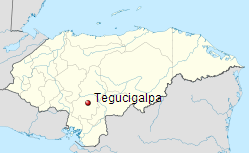HIV/AIDS in Honduras
HIV/AIDS in Honduras is a significant public health challenge that affects the lives of many individuals and communities across the country. Honduras has one of the highest rates of HIV/AIDS in Central America, making it a critical area of concern for both national and international health organizations.
Epidemiology[edit | edit source]
The prevalence of HIV in Honduras varies significantly among different populations and regions. The epidemic is concentrated primarily among certain high-risk groups, including men who have sex with men (MSM), commercial sex workers, and transgender individuals. However, heterosexual transmission remains the primary mode of transmission among the general population.
As of the latest reports, the adult HIV prevalence rate in Honduras is estimated to be higher than the average for Latin America and the Caribbean. The number of people living with HIV/AIDS in the country is in the tens of thousands, with new infections occurring each year. Despite efforts to control the spread of HIV, the epidemic continues to pose a significant public health threat.
Prevention and Control[edit | edit source]
The Honduran government, in collaboration with various non-governmental organizations (NGOs) and international agencies, has implemented several strategies to prevent the spread of HIV and provide care and support to those affected. These efforts include:
- Promoting HIV testing and counseling to encourage early diagnosis and treatment.
- Providing free or subsidized antiretroviral therapy (ART) to people living with HIV/AIDS.
- Implementing educational campaigns to raise awareness about HIV transmission and prevention methods.
- Distributing condoms and promoting safe sex practices to reduce the risk of HIV transmission.
- Offering support services to people living with HIV/AIDS and their families.
Challenges[edit | edit source]
Despite these efforts, several challenges hinder the effective management of the HIV/AIDS epidemic in Honduras. Stigma and discrimination against people living with HIV/AIDS and key affected populations can limit access to testing and treatment services. Additionally, limited resources and infrastructure can restrict the availability and quality of healthcare services for those affected by HIV/AIDS.
Future Directions[edit | edit source]
To address the ongoing challenge of HIV/AIDS in Honduras, it is crucial to strengthen existing prevention and treatment programs and to invest in new strategies that can more effectively reach at-risk populations. This includes enhancing community engagement, improving access to healthcare services, and increasing funding for HIV/AIDS research and programs.
Improving the overall health system in Honduras is also essential to ensure that all individuals, regardless of their HIV status, can access the care and support they need. With continued commitment and collaboration, it is possible to make significant progress in the fight against HIV/AIDS in Honduras.
Navigation: Wellness - Encyclopedia - Health topics - Disease Index - Drugs - World Directory - Gray's Anatomy - Keto diet - Recipes
Search WikiMD
Ad.Tired of being Overweight? Try W8MD's physician weight loss program.
Semaglutide (Ozempic / Wegovy and Tirzepatide (Mounjaro / Zepbound) available.
Advertise on WikiMD
WikiMD is not a substitute for professional medical advice. See full disclaimer.
Credits:Most images are courtesy of Wikimedia commons, and templates Wikipedia, licensed under CC BY SA or similar.Contributors: Prab R. Tumpati, MD

